Music has always been a powerful medium that has the ability to transcend boundaries and connect people on a deep emotional level.
But did you know that music also has the potential to act as a healing agent, especially for individuals living with epilepsy? This neurological disorder affects millions of people worldwide and is characterized by recurrent seizures.
While there are various treatment options available for epilepsy, researchers have recently started exploring the therapeutic potential of music as a complementary therapy for managing seizures and improving the overall well-being of individuals with epilepsy. In this article, we delve into the healing power of sound and examine how music can effectively serve as a form of medicine for epilepsy.
The Science Behind Music and Epilepsy
Research has shown that music can stimulate numerous areas of the brain, including those involved in emotions, memory, and movement. In the case of epilepsy, scientists believe that specific brainwave patterns can trigger seizures.
However, music has the potential to influence and modulate these brainwave patterns, resulting in a reduction in seizure activity. Additionally, music therapy has been found to engage the brain’s reward system, promoting the release of endorphins and other feel-good neurotransmitters. This can help alleviate stress and anxiety, common triggers for seizures.
Music Therapy: A Multidimensional Approach
Music therapy is a holistic approach that utilizes the power of music in a structured and therapeutic manner.
It involves the involvement of a trained music therapist who tailors music-based interventions to address the particular needs and goals of individuals with epilepsy. These interventions can include activities such as listening to music, singing, playing instruments, composing, and improvising.
The therapist carefully selects or creates music that is both enjoyable and supportive of the individual’s physical, emotional, and cognitive well-being.
Reducing Stress and Anxiety
Stress and anxiety play a significant role in triggering and exacerbating seizures in individuals with epilepsy. Fortunately, music therapy can significantly reduce these negative emotions.
Listening to calming music, such as slow and steady classical compositions or nature sounds, can help activate the body’s relaxation response and promote a sense of tranquility. Similarly, engaging in active music-making activities like playing an instrument or singing can distract the mind, boost self-confidence, and enhance emotional well-being.
Improving Cognitive Functions
Epilepsy may affect cognitive functions such as memory, attention, and executive function. Music therapy has been found to have a positive impact on these cognitive areas.
For instance, rhythm-based activities can improve concentration and attention span, while learning to play a musical instrument or read sheet music can enhance memory skills. Moreover, engaging with music in a structured manner can strengthen brain connections, promoting overall cognitive development.
Social Connection and Emotional Support
Living with epilepsy can at times be isolating and emotionally challenging. Music therapy provides a supportive and inclusive space where individuals can connect with others who may share similar experiences.
Group music therapy sessions offer peer support, foster a sense of community, and provide opportunities for meaningful social interactions. Through music, individuals can express their emotions, find solace, and gain a sense of belonging.
Music and Seizure Management
While music therapy does not claim to cure epilepsy, it can be a valuable tool for managing seizures and minimizing their impact on daily life.
One promising approach is called “entrainment,” where individuals synchronize their movements or brainwaves to a rhythmic stimulus, such as a steady beat or a musical tone. This process has been shown to modulate brainwave activity, potentially reducing seizure occurrence and severity. Additionally, music can act as a calming influence during a seizure episode, helping individuals regain a sense of control and relaxation.
Personalized Playlists for Seizure Control
Another unique aspect of music therapy for epilepsy is the creation of personalized playlists. Music therapists work closely with individuals to identify specific musical elements, rhythms, or melodies that either trigger or alleviate seizures.
By analyzing the individual’s unique responses to different types of music, therapists can create tailored playlists that promote relaxation, reduce stress, and potentially even disrupt seizure activity. These playlists can be used during daily activities or as targeted interventions during aura or pre-seizure stages.
Integration with Traditional Epilepsy Treatments
It is important to note that music therapy is not a standalone treatment for epilepsy but rather supplement to existing medical interventions.
It should be viewed as a complementary therapy that can be integrated seamlessly with traditional epilepsy treatments, including medication, diet, and surgery. By incorporating music therapy into a comprehensive management plan, individuals can experience a more holistic approach to their well-being and potentially enhance treatment outcomes.
Conclusion
Music medicine for epilepsy offers a unique and innovative way to manage seizures and improve the overall quality of life for individuals with epilepsy.
Through various music-based interventions, individuals can find solace, reduce stress, enhance cognitive function, and connect with others in a supportive environment. While further research is needed to fully understand the mechanisms at play, the healing power of sound is undeniable.
Music therapy, when combined with traditional epilepsy treatments, has the potential to bring about positive changes in the lives of those living with epilepsy.




























